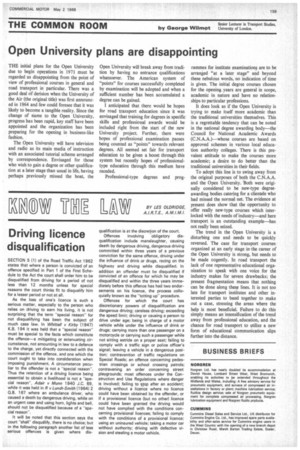Open University plans are disappointing
Page 161

If you've noticed an error in this article please click here to report it so we can fix it.
THE initial plans for the Open University due to begin operations in 1971 must be regarded as disappointing from the point of view of professional courses in general and road transport in particular. There was a good deal of derision when the University of the Air (the original title) was first announced in 1964 and few could foresee that it was likely to become a tangible reality. Since the change of name to the Open University. progress has been rapid, key staff have been appointed and the organization has been preparing for the opening in business-like fashion.
The Open University will have television and radio as its main media of instruction with an associated tutorial scheme arranged by correspondence. Envisaged for those who wish to gain a degree or other qualification at a later stage than usual in life, having perhaps previously missed the boat, the Open University will break away from tradition by having no entrance qualifications whatsoever. The American system of "points" for courses successfully completed by examination will be adopted and when a sufficient number has been accumulated a degree can be gained.
I anticipated that there would be hopes for road transport education since it was envisaged that training for degrees in specific skills and professional awards would be included right from the start of the new University project. Further, there were hopes of professional examination passes being counted as -points" towards relevant degrees. All seemed set fair for transport education to be given a boost through this system hut recently hopes of professionaltype education through this medium have receded.
Professional-type degrees and prog rammes for institute examinations are to be arranged "at a later stage" and beyond these nebulous words, no indication of time is given. The initial degree courses chosen for the opening years arc general in scope, academic in nature and have no relationships to particular professions.
It does look as if the Open University is trying to make itself more academic than the traditional universities themselves. This is a regrettable tendency that can be noted in the national degree awarding body—the Council for National Academic Awards (C.N.A.A.)—whose courses are based on approved schemes in various local educa tion authority colleges. There is this prevalent attitude to make the courses more academic; a desire to do better than the traditional universities in their fields.
To adopt this line is to swing away from the original purposes of both the C.N.A.A.
and the Open University. Both were origi
nally considered to be new-type degreeawarding bodies catering for a clientele who had missed the normal net. The evidence at present does show that the opportunity to offer really new-type courses which inter locked with the needs of industry—and here transport is an outstanding example—has not really been seized.
The trend in the Open University is a disturbing one and needs to be quickly reversed. The case for transport courses organized at an early stage in the career of the Open University is strong, but needs to be made cogently. In road transport the lack of one representative educational organization to speak with one voice for the industry makes for severe drawbacks: the present fragmentation means that nothing can be done along these lines. It is not too late for transport institutes and other in terested parties to band together to make out a case, stressing the areas where the help is most beneficial. Failure to do this simply means an intensification of the trend away from professional education, and the chance for road transport to utilize a new form of educational communication slips further into the distance.




















































































































































































































